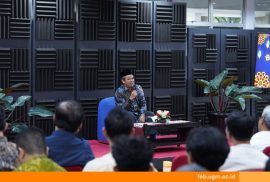Students from the International Undergraduate Program (IUP) at the Faculty of Economics and Business, Universitas Gadjah Mada (FEB UGM) conducted a field study visit to Wondis Chocolate, a Micro, Small, and Medium Enterprise (MSMEs) located in Salakmalang Village, Kulonprogo., on Tuesday (26/22/2024).
Prof. Dr. Catur Sugiyanto, M.A., a faculty member at FEB UGM and mentor for the activity, explained that the field study involved IUP students enrolled in the Indonesian Economy course. The activity represents a collaborative learning model that engages the Pawon Gendis Women Farmers Group (KWT), Wondis Chocolate SMEs, and the Cocoa Farmers Group to support local economic development.
“This activity provides students hands-on experience in integrating the Sustainable Development Goals (SDGs) principles, particularly SDG 1: No Poverty and SDG 5: Gender Equality. The synergy between SMEs, farmer groups, and KWT Pawon Gendis is a tangible example of poverty reduction through local economic empowerment with women as the main actors,” Catur said in a recent press release.
This business practice aims to improve the economic well-being of the local community and promote gender equality by strengthening women’s role in financial activities. KWT Pawon Gendis, consisting of 24 members, manages various home-based businesses such as catering, snacks, and cendol dawet (a traditional Indonesian dessert). They work with Wondis Chocolate SMEs to market local products through the Wondis Chocolate Café, especially during special events or guest visits. In addition, a mutual agreement to use local products forms the basis of their cooperation.
Prof. Catur emphasized that this collaborative model serves as a strategy for mutual growth at the village level. Agreements on fair cocoa prices for farmers and efforts to maintain the quality and quantity of cocoa supply are key to the success of this synergy.
In addition to discussing collaborative strategies, the students participated in hands-on chocolate-making processes during the field study, from processing cocoa beans to producing finished products. This activity provided them with practical insights into the development of agricultural-based SMEs, which aligned with their coursework in the Indonesian Economy class.
“This experience offers a new perspective on how local synergies can address economic challenges while supporting sustainable development goals,” said Catur.
He hoped this collaboration could inspire new approaches to rural economic development in other regions, particularly in strengthening synergies between SMEs, farmer groups, and local communities to create a more prosperous and equitable society.
“We hope this experience will inspire students to recognize the potential of local, community-based economic collaborations that empower communities and support sustainable development goals,” Catur concluded.
Writer: Shofi Hawa Anjani
Editor: Kurnia Ekaptiningrum
Sustainable Development Goals









